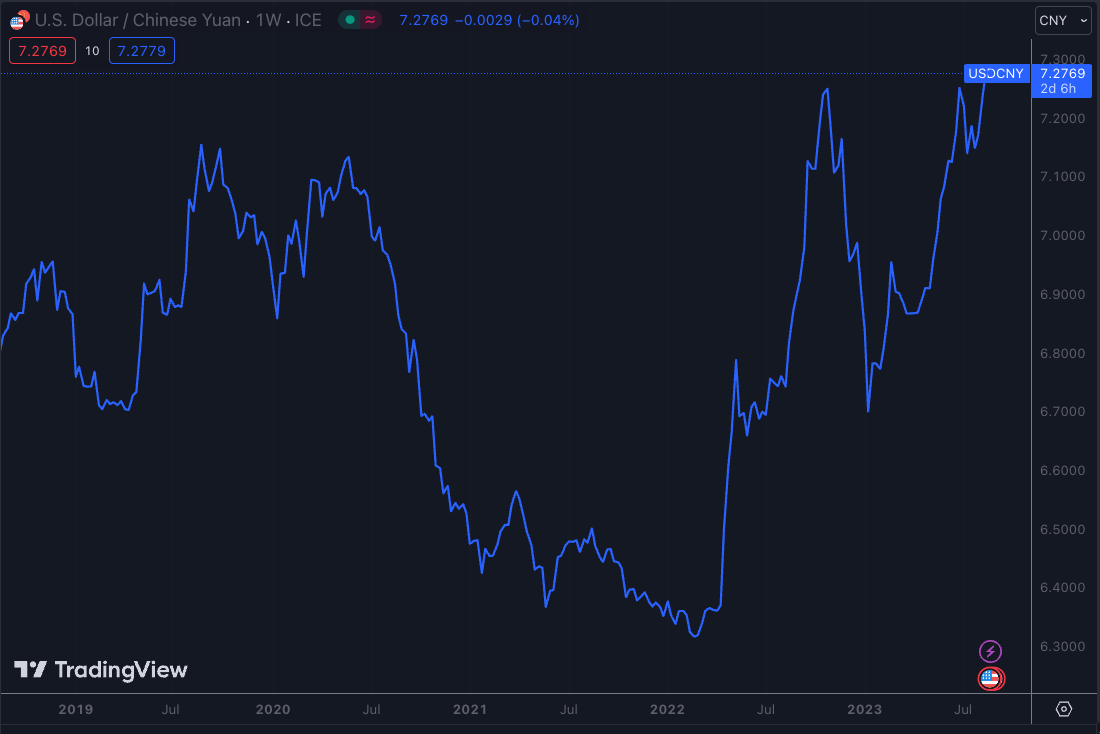Endgame #1
Welcome to Endgame, the short weekly newsletter covering the biggest events in macro and how they tie into the Dollar Endgame. Let’s get started.
This week will be a little off, but going forward I will be publishing these articles once a week.
Argentina
Last week, a massive currency devaluation was sparked in Argentina, where the central bank decided to raise rates to an eye-watering 118% and simultaneously debase the currency by 20%. This development comes after a rapid rate hiking cycle this year, where the Argentine government has taken rates from 70% up past 100% in a few months. Their central bank has been busy, monetizing the debts that their federal government has been racking up. As I covered in the premium piece “Argentina Enters the Endgame”, the Argentine Central Bank has DOUBLED it’s balance sheet in just the last 8 months! Money supply, when adjusted for the devaluation in USD, is up 116% year to date.
Argentina’s inflation rate is at a terrifying 113%, or 12% a month, and is showing no signs of abating. The Buenos Aires airport has turned into a quasi homeless shelter, and people are scavenging the landfills for food. The situation there is dire.
There is hope, however. Presidential hopeful Javier Milei is promising to reduce the amount of government ministries from 18 to 8, slash spending, reduce subsidies to corporations, and most importantly, dismantle the Banco Central de Argentina, eliminating the money printer and restoring monetary stability.
China
China’s property woes continued to worsen last week, with several key developments in the real estate market. Country Garden, once China’s biggest property firm, is on the brink of default after missing two US-dollar coupon payments worth US$22.5 million earlier this month, and suspended trading in 11 onshore bonds last Monday. Whether it can make these coupon payments within a 30-day grace period will determine whether the developer is truly in default.
Many laborers are going unpaid, with some saying that they haven’t received any form of compensation since January. The company has halted construction at dozens of sites, including apartments and residential buildings.
Another firm, Zhongrong Trust, a wealth manager, has missed payments on some of its wealth products and is not clarifying when the payouts will resume. The trust is part of the shadow banking network in China, a consortium of non-bank financial institutions that engage in lending, borrowing and trading but are not regulated like banks. Surprisingly, the firm claimed that the notices sent out last Monday stating that the firm would miss payments were issued by “criminals”, and were false. However, the company still has not made payments and is still in PR damage control trying to come up with reasons why this occurred.
Perhaps more concerning is the fall in consumer prices into the negative YoY territory, pushing China into deflation. As Reuters pointed out- ”The consumer price index (CPI) dropped 0.3% year-on-year in July, the National Bureau of Statistics (NBS) said on Wednesday, compared with the median estimate for a 0.4% decrease in a Reuters poll. It was the first decline since February 2021.”
China is the first G20 country to fall into deflation in 2 years, and being a large exporter, this is a sign of a possible global recession coming to the rest of the world. China has also been busy defending their currency, as the Yuan has fallen to its lowest level in 5 years. China does not want the Yuan to devalue past 7.3 to the dollar, and has thus been defending it around that level.
China has ordered state banks to sell USDs and buy Yuan on the open market to support their currency, using banking system reserves as a first line of defense to shore up their currency. This will only last so long, and once they are out, the next option will be starting to offload the $880B or so of US Treasuries they still hold on the balance sheet of their central bank, the People’s Bank of China (PBOC).
This development would push yields up in the U.S., exacerbating the debt spiral and increasing Federal government borrowing. Not only that, but dollar shortages anywhere in the world are not good for the global economy. Remember, although China may not be our political ally, they still supply a huge amount of raw materials and low-end manufactured goods to the U.S., and are our biggest trading partner. Efforts to re-shore supply chains have been taking place since covid, but it’s a slow and gradual process and will not happen overnight.
We will have to watch what happens, as if China slips further into deflation and recession, this could cause ripple effects throughout Asia.
BRICS
This week, the BRICS alliance is meeting in South Africa, where China and Russia hope to discuss strategies to end dollar dominance and perhaps even bring a few more nations into the fold.
One of the main countries in focus is Saudi Arabia, one of the largest oil exporters and a key U.S. ally in the Middle East. Formal entry of Saudi into BRICS would not be a good sign for America, as they are one of the key pillars in supporting the global petrodollar standard. BRICS hopes to expand membership to more nations, ranging from Argentina to Algeria, Egypt, Iran, Indonesia and the United Arab Emirates. All these countries have formally applied to join along with Saudi, but unfortunately a strong guideline for membership has not yet been set up.
This is what the meeting this week aims to do.
“BRICS expansion has become the top trending issue at the moment,” said Chen Xiaodong, China’s ambassador to South Africa. “Expansion is key to enhancing (the) BRICS mechanism’s vitality. I believe that this year’s summit will witness a new and solid step on this front.”
The United States has emphasized its bilateral relationships with South Africa, Brazil, and India, aiming to counter potential significant influence from Russia and China within the BRICS group. As the summit approached, the State Department conveyed that the U.S. was actively involved in extensive discussions with several prominent members of the BRICS alliance.
So far, around 40 nations have expressed interest, and if a membership plan is put in place, more nations are likely to join the fold.
However, as I have expressed on Twitter, this is not as easy as they are making it out to be.
Although there are definite signs that the world wants to move off the dollar standard, desire is not the same as an actual solution, as the propositions currently being put forth are dead in the water. The issue is all these countries are running different economic and fiscal policies, and common currencies would have to be issued by a centralized entity. Who would control it? And what would it’s monetary policy be?
If it is backed by gold, who audits the vaults? And if redemptions ensue, who pays up? These questions and more seem ripe to tear apart any fiat money that BRICS puts forth to replace the dollar. The best they can hope for is more bilateral trade in their own currencies- but this will be limited as demand for South African Rand, or Russian Roubles, or Chinese Yuan is not strong outside their borders. Plus, as I have already discussed at length, a new reserve currency will face Triffin’s dilemma and be subject to international current account deficits- meaning more and more of the currency will have to be produced to grease the wheels of global trade. Typically, holders of the currency like to reinvest the money back into bond and equity markets denominated in that currency- but BRICS has no such markets built, and creating them would be a long and arduous process, especially given that multiple countries would be “regulating” it.
As you can see, BRICs is a mess and is more an emblem than an actual coalition with actionable policy. There is a strong and growing desire globally to leave the USD status quo, but a new reserve currency needs to be found.
Luckily we already found one in Bitcoin. I wonder what happens when BRICS, and indeed the rest of the world realizes this.
Thanks for reading! As mentioned, this is a new and experimental format so it may be subject to tweaks and adjustments. Let me know on Twitter what topics you’d like me to touch on next and I will see you next week!








This is great for those who cannot keep track of the day-to-day movements and happenings in the financial markets. I'ts a good summary with view points aligned to your thesis. Keep it up!